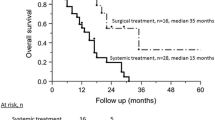Abstract
Background
Isolated pancreatic metastasis from melanoma is extremely uncommon and accounts for approximately only 2% of visceral disseminations of melanoma.1,2,3 Interestingly, pancreatic localizations disproportionately derive from primary ocular melanoma.1,2 Despite the currently available evidence on this argument being scarce, the survival outcomes of patients receiving resection for visceral melanoma metastases are reported to be superior than those managed by non-surgical modalities.4,5
Case Presentation
A 59-year-old female with a history of uveal melanoma presented with surveillance-detected metastatic disease confined to the pancreas. Computed tomography demonstrated one lesion located in the body of the pancreas and one further lesion in the head. The presented video illustrates the details of an extended, ultrasound-guided, robotic distal pancreatectomy.
Discussion
Metastatic ocular melanoma has a highly variable natural history, which ranges from a fulminant course to prolonged stable disease.6 In contrast to cutaneous melanoma derivation, metastases mostly occur via hematogenous spread, in the absence of lymphatic drainage of the eye.6,7 Liver is the most common site of secondary localization and is not involved by metastatic disease in <10% of cases. Interestingly, patients with extrahepatic metastases tend to have significantly better survival rates than those with hepatic disease.6,7 Fewer than 100 cases of pancreatic metastasis from malignant melanoma are reported in the medical literature, including a relatively high percentage of primary ocular malignancies.1,5 Furthermore, the prognosis of these patients is essentially unknown, although metastatic melanoma of both cutaneous and ocular origin generally indicates poor survival.1,5,6 Although no robust evidence is available, a number of reports suggest that pancreatic resection may improve survival in these patients.1,2,3,4 A large retrospective review investigating the association between treatment modalities and survival of patients with abdominal visceral melanoma metastases showed that patients receiving resection had a superior median survival compared with patients treated medically. Although patients with metastases of the gastrointestinal tract showed the best outcomes following surgery, patients with pancreas metastasis (of both cutaneous and ocular origin) undergoing resection also exhibited a significant survival advantage compared with those treated non-surgically.5 Minimally invasive pancreatectomy is gaining momentum.8 In fact, in selected patients there are distinct advantages compared with conventional surgery owing to reduced postoperative morbidity and earlier return to daily activities, while maintaining the oncological tenets of resection.8,9,10 Recent reports suggest that the application of robots may provide some advantages over conventional laparoscopy, especially for patients necessitating technically challenging surgeries.8,11 Such benefits are mainly in relation to the rate of conversion, length of postoperative hospital stay, and number of cases necessary to surmount the learning curve and reach optimal performance; however, no definitive conclusions can be drawn due to the lack of high-level evidence.8,10
Similar content being viewed by others
References
Nakamura Y, Yamada R, Kaneko M, Naota H, Fujimura Y, Tabata M, et al. Isolated pancreatic metastasis from malignant melanoma: a case report and literature review. Clin J Gastroenterol. 2019;12:626–36.
Nikfarjam M, Evans P, Christophi C. Pancreatic resection for metastatic melanoma. HPB (Oxford). 2003;5:174–9.
Pang JC, Roh MH. Metastases to the pancreas encountered on endoscopic ultrasound-guided fine-needle aspiration. Arch Pathol Lab Med. 2015;139:1248–52.
Wood TF, DiFronzo LA, Rose DM, Haigh PI, Stern SL, Wanek L, et al. Does complete resection of melanoma metastatic to solid intra-abdominal organs improve survival? Ann Surg Oncol. 2001;8:658–62.
Deutsch GB, Flaherty DC, Kirchoff DD, Bailey M, Vitug S, Foshag LJ, et al. Association of surgical treatment, systemic therapy, and survival in patients with abdominal visceral melanoma metastases, 1965–2014: relevance of surgical cure in the era of modern systemic therapy. JAMA Surg. 2017;152:672–8.
Lane AM, Kim IK, Gragoudas ES. Survival rates in patients after treatment for metastasis from uveal melanoma. JAMA Ophthalmol. 2018;136:981–6.
Mariani P, Servois V, Piperno-Neumann S. Therapeutic options in metastatic uveal melanoma. Dev Ophthalmol. 2012;49:166–81.
Schwarz JL, Hogg ME. Current state of minimally invasive pancreatic surgery. J Surg Oncol. 2021;123:1370–86.
Partelli S, Ricci C, Cinelli L, et al. Evaluation of cost-effectiveness among open, laparoscopic and robotic distal pancreatectomy: a systematic review and meta-analysis. Am J Surg. 2021;222(3):513–20.
Chan KS, Wang ZK, Syn N, Goh BKP. Learning curve of laparoscopic and robotic pancreas resections: a systematic review. Surgery. 2021;170:194–206.
Guerra F, Giuliani G, Coletta D. The risk of conversion in minimally invasive oncological abdominal surgery. Meta-analysis of randomized evidence comparing traditional laparoscopic versus robot-assisted techniques. Langenbecks Arch Surg. 2021;406:607–12.
Funding
No grants or other sources of funding were received for the preparation of this manuscript, which has not been submitted or is not under consideration elsewhere.
Author information
Authors and Affiliations
Contributions
All authors contributed equally to the preparation of this manuscript.
Corresponding author
Ethics declarations
Disclosures
Francesco Guerra, Ubaldo Marra, Giuseppe Giuliani, and Andrea Coratti have no conflicts of interest to declare.
Additional information
Publisher's Note
Springer Nature remains neutral with regard to jurisdictional claims in published maps and institutional affiliations.
Supplementary Information
Below is the link to the electronic supplementary material.
Supplementary file 1 (MP4 343397 KB)
Rights and permissions
About this article
Cite this article
Guerra, F., Marra, U., Giuliani, G. et al. Robotic Extended Ultrasound-Guided Distal Pancreatectomy for Pancreatic Metastases from Uveal Melanoma. Ann Surg Oncol 29, 2469–2470 (2022). https://doi.org/10.1245/s10434-021-11116-5
Received:
Accepted:
Published:
Issue Date:
DOI: https://doi.org/10.1245/s10434-021-11116-5




